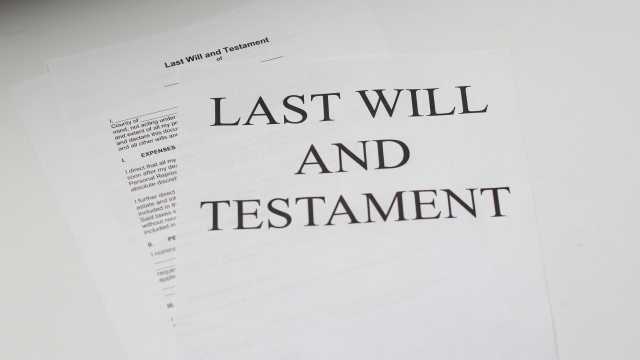Estate Planning
When you die, you’ll leave behind belongings. Everything you own both tangible and non-tangible will need to be distributed among your survivors.

Stephanie Faris
•
Published April 14th, 2021
Table of Contents
Key Takeaways
Your estate is the sum total of all the assets you own, including your home and everything in it.
Your estate comes into play in two situations: when you die and if you file bankruptcy.
The best way to ensure your estate is distributed according to your wishes is to write a legally valid will.
When you die, you’ll leave behind belongings. Everything you own both tangible and non-tangible will need to be distributed among your survivors, who may choose to sell it. These belongings are known as your estate.
But the estate definition applies to planning what will happen to those assets upon your death. Estate planning becomes increasingly important as you get older, especially if you have children or dependents you want to provide for. Here’s what you need to know about estates.
What Is an Estate?
If you’re asking what is an estate, you may already have a general idea. You might envision an “estate” in the country, but for legal purposes, “estate” refers to how the property you own comes into play after your death.
To define estate, it’s important to look at the assets that are considered part of your estate:
- Your home, condo, or any other raw land assuming you own. Property you rent is not part of your estate.
- All the owned assets inside a home you own or rent, including jewelry, furniture, clothing, books, and collectibles.
- Funds from any financial investments you’ve made, including retirement savings accounts.
- Funds you have in bank accounts.
- Insurance policies that have payable benefits.
Why is all of this important? Because at the time of your death, any assets you own will be assigned a financial value. These assets then receive different tax treatment depending on the asset type and the associated IRS tax code section. Your estate will also be assigned a value if you ever file bankruptcy.
If you die without a will, your death will be considered “intestate.” At that point, your assets are distributed in accordance with local laws. The estate typically is assigned a financial value, with assets distributed evenly among heirs. With a will, as long as the will is deemed valid by local courts, your assets will be distributed according to your wishes.
How Estates Are Managed
Since the estate meaning usually doesn’t come up until you’ve died, it’s important to know what happens after death. Without a will, your assets are evenly distributed among your discoverable heirs. If you have a spouse, chances are your estate will be handed over to that person. If you’re single, the assets will be distributed according to local laws. If no relatives can be found, everything usually reverts to the state.
As you review what does estate mean, though, it can become apparent that a will is pretty important. This is especially true of unmarried couples who live together, as significant others usually don’t enjoy the same protections married couples do. If you have complications like children from other marriages, it’s important to make sure those children get a share of the estate, as well, rather than having it all automatically revert to the surviving spouse.
Writing a Will
The best way to ensure your estate property is distributed after your death is to put a will in place. You don’t need an attorney to write a will. In fact, you can find online templates and software platforms that will help you create one. If you go the do-it-yourself route, though, it’s a good idea to have it notarized and make sure it’s in the custody of someone you trust to present it if you die.
Estate laws can be complicated, though, so working with an attorney who specializes in these laws is the best course of action. This will ensure that when you’re deceased, estate assets will be distributed exactly how you want. Not only will an estate attorney make sure your will is legal, but you’ll also get advice specific to the laws in your own area.
Final Thoughts
Having a will is the best way to ensure every estate beneficiary gets the assets you intend. The more complicated your situation and the more valuable the assets you own, the better idea it is to consult an attorney who specializes in estate planning law. A Certified Financial Planner® can also help you make sure that you understand your assets and the value they’ll have to the people you love most.
Share this advice

Stephanie Faris has written about finance for entrepreneurs and marketing firms since 2013. She spent nearly a year as a writer for a credit card processing service and has written about finance for numerous marketing firms and entrepreneurs. Her work has appeared on Money Under 30, The Motley Fool, MoneyGeek, E-commerce Insiders, and GoBankingRates.
Intro to Estate Planning
Wills
Trusts
Divorce Considerations For Retirement
Estate Settlement
Share this advice

Stephanie Faris has written about finance for entrepreneurs and marketing firms since 2013. She spent nearly a year as a writer for a credit card processing service and has written about finance for numerous marketing firms and entrepreneurs. Her work has appeared on Money Under 30, The Motley Fool, MoneyGeek, E-commerce Insiders, and GoBankingRates.


